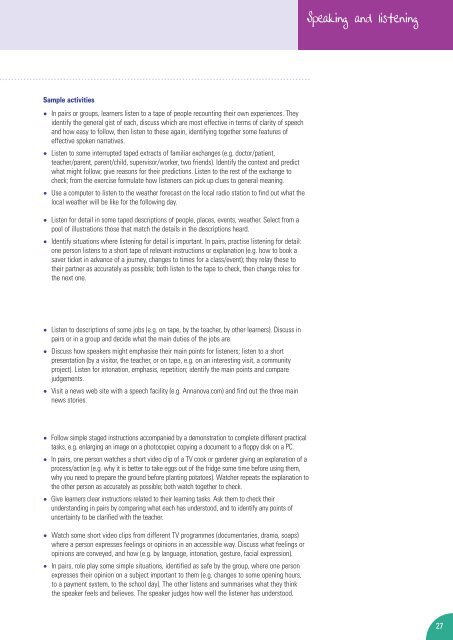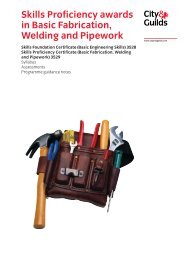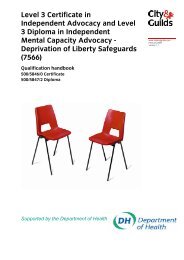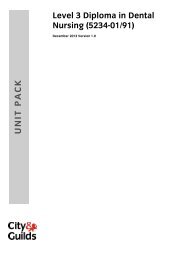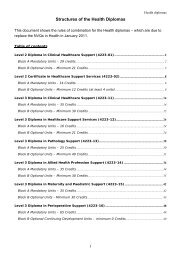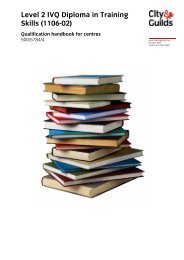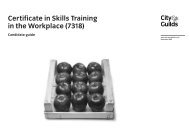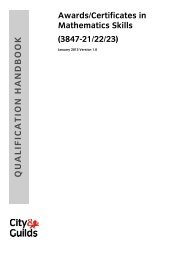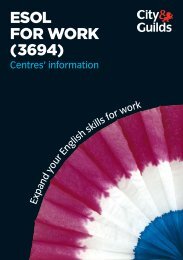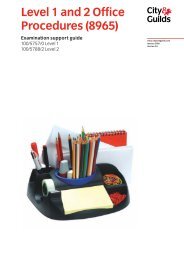Adult Literacy Core Curriculum - Nationally developed Skills for Life ...
Adult Literacy Core Curriculum - Nationally developed Skills for Life ...
Adult Literacy Core Curriculum - Nationally developed Skills for Life ...
Create successful ePaper yourself
Turn your PDF publications into a flip-book with our unique Google optimized e-Paper software.
Sample activities<br />
• In pairs or groups, learners listen to a tape of people recounting their own experiences. They<br />
identify the general gist of each, discuss which are most effective in terms of clarity of speech<br />
and how easy to follow, then listen to these again, identifying together some features of<br />
effective spoken narratives.<br />
• Listen to some interrupted taped extracts of familiar exchanges (e.g. doctor/patient,<br />
teacher/parent, parent/child, supervisor/worker, two friends). Identify the context and predict<br />
what might follow; give reasons <strong>for</strong> their predictions. Listen to the rest of the exchange to<br />
check; from the exercise <strong>for</strong>mulate how listeners can pick up clues to general meaning.<br />
• Use a computer to listen to the weather <strong>for</strong>ecast on the local radio station to find out what the<br />
local weather will be like <strong>for</strong> the following day.<br />
• Listen <strong>for</strong> detail in some taped descriptions of people, places, events, weather. Select from a<br />
pool of illustrations those that match the details in the descriptions heard.<br />
• Identify situations where listening <strong>for</strong> detail is important. In pairs, practise listening <strong>for</strong> detail:<br />
one person listens to a short tape of relevant instructions or explanation (e.g. how to book a<br />
saver ticket in advance of a journey, changes to times <strong>for</strong> a class/event); they relay these to<br />
their partner as accurately as possible; both listen to the tape to check, then change roles <strong>for</strong><br />
the next one.<br />
• Listen to descriptions of some jobs (e.g. on tape, by the teacher, by other learners). Discuss in<br />
pairs or in a group and decide what the main duties of the jobs are.<br />
• Discuss how speakers might emphasise their main points <strong>for</strong> listeners; listen to a short<br />
presentation (by a visitor, the teacher, or on tape, e.g. on an interesting visit, a community<br />
project). Listen <strong>for</strong> intonation, emphasis, repetition; identify the main points and compare<br />
judgements.<br />
• Visit a news web site with a speech facility (e.g. Annanova.com) and find out the three main<br />
news stories.<br />
• Follow simple staged instructions accompanied by a demonstration to complete different practical<br />
tasks, e.g. enlarging an image on a photocopier, copying a document to a floppy disk on a PC.<br />
• In pairs, one person watches a short video clip of a TV cook or gardener giving an explanation of a<br />
process/action (e.g. why it is better to take eggs out of the fridge some time be<strong>for</strong>e using them,<br />
why you need to prepare the ground be<strong>for</strong>e planting potatoes). Watcher repeats the explanation to<br />
the other person as accurately as possible; both watch together to check.<br />
• Give learners clear instructions related to their learning tasks. Ask them to check their<br />
understanding in pairs by comparing what each has understood, and to identify any points of<br />
uncertainty to be clarified with the teacher.<br />
• Watch some short video clips from different TV programmes (documentaries, drama, soaps)<br />
where a person expresses feelings or opinions in an accessible way. Discuss what feelings or<br />
opinions are conveyed, and how (e.g. by language, intonation, gesture, facial expression).<br />
• In pairs, role play some simple situations, identified as safe by the group, where one person<br />
expresses their opinion on a subject important to them (e.g. changes to some opening hours,<br />
to a payment system, to the school day). The other listens and summarises what they think<br />
the speaker feels and believes. The speaker judges how well the listener has understood.<br />
Speaking and listening<br />
27


